A broken system for a broken people
- Published
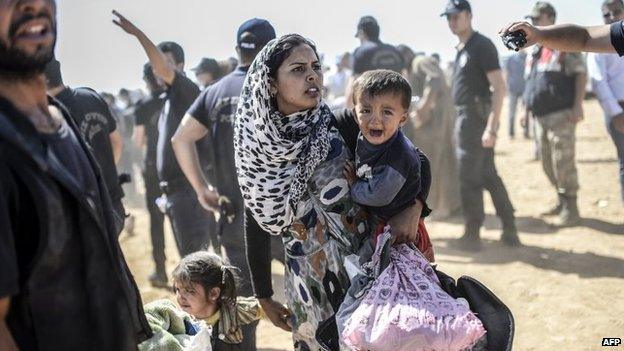
Millions have been forced to flee their homes because of the Syrian conflict
"They're no longer living. They feel they are dying. That's why they're willing to take the risk."
That's what I heard from Metin Corabatir, founder of the Ankara-based Refugee Centre for Asylum and Migration, in the last hours of 2014 as a rusting livestock freighter, packed with nearly 1,000 exhausted Syrians, was rescued off the coast of Italy.
Now Lebanon, the country with the world's highest per capita concentration of refugees, has made it clear it simply can't take any more. The number of Syrians already in Lebanon is thought to be equivalent to about one third of Lebanon's official population. But from now on, Syrians will need a visa to enter.
A new year has barely started and it's shining a harsh searchlight on an international aid system that, like a battered boat, is cracking at its seams.
'Ghost boats'
"The system is totally broken," regrets Jan Egeland, the former UN humanitarian envoy who now heads the Norwegian Refugee Council. "We cannot continue in this way."
There's similar anxiety at the top of the UN system. Reflecting on the year that just ended, the head of the UN refugee agency UNHCR, Antonio Guterres, described 2014 as "not only the worst year, but the year in which the humanitarian system was reaching a breaking point".
The year 2015 could be even worse if the world's creaking lifeboat doesn't change course.
The new year was ushered in with alarm over the spectre of these "ghost boats" hurtling on autopilot towards European shores in high winds and choppy seas. It's the new tactic of smugglers eager to exploit the desperation of refugees ready to risk all to reach a safe haven in Europe.
So profound is the pressure to escape that even women about to give birth boarded the boat.
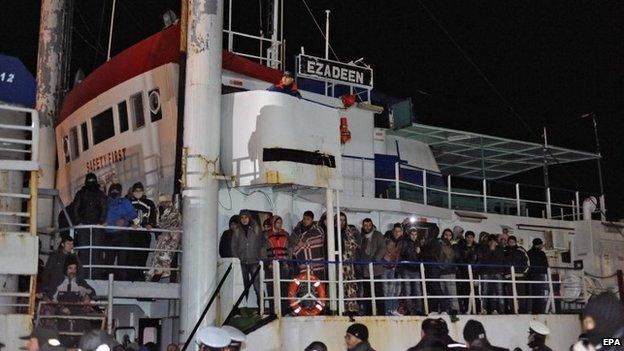
"Ghost boats" full of desperate asylum seekers have been found sailing towards Europe, abandoned by their crew
Syria's neighbours, including Lebanon, Turkey, Iraq and Jordan, have already taken in some 97% of more than 3.2 million registered Syrian refugees. All of these countries are reaching their own breaking point as their own systems struggle to cope.
Most doors in Europe have barely opened in response to what the UN calls the "biggest humanitarian test of our time". So far Britain has taken in fewer than 100 Syrian refugees. Germany has been the most generous, offering to accept 30,000, which is about half of what the rest of the world, outside the region, has been willing to take in.
Amnesty International, in its recent report "Left Out In The Cold", highlights that not a single place has been offered for a Syrian refugee in Gulf states, Russia or China.
The first week of this year has also highlighted the other side of this story. In German cities, pro- and anti-immigration protests competed for space - both spatial and political - on the streets. It's a major issue in many European nations.
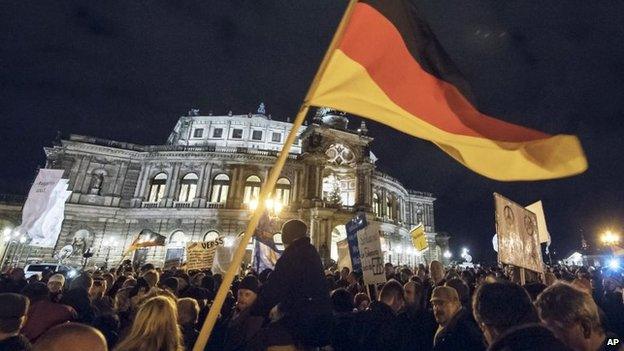
Pro- and anti-immigration protests have been held in Germany
"I do not accept that the global economy is overwhelmed by Syria's humanitarian crisis," insists Jan Egeland in a telephone interview from Oslo.
"In Norway alone," he points out, "the total amount of spending on Christmas equals the $7.2bn requested for Syria and its neighbours in the UN's latest humanitarian appeal."
It's not just Syria's punishing war, now in its fourth year, that is lasting longer and costing more than anyone expected.
'Old and new wars'
In December the UN launched the biggest humanitarian appeal in its history, asking for more than $16bn to fund its operations worldwide. Seventy per cent of the money was for four countries mired in intractable conflicts: Syria, Iraq, South Sudan and the Central African Republic.
"We don't see an end to this," the UN's humanitarian envoy Valerie Amos told me at the time. "More countries are giving money but, every year, the figures go up substantially."
Never has the world seen so many humanitarian crises all at the same time in such a short period.
"There are more people needing help, because old wars from the Democratic Republic of Congo to Somalia are continuing, while new wars in Syria, Iraq and South Sudan are starting," reflects David Miliband, Britain's former Foreign Secretary who now heads the International Rescue Committee, a relief charity.
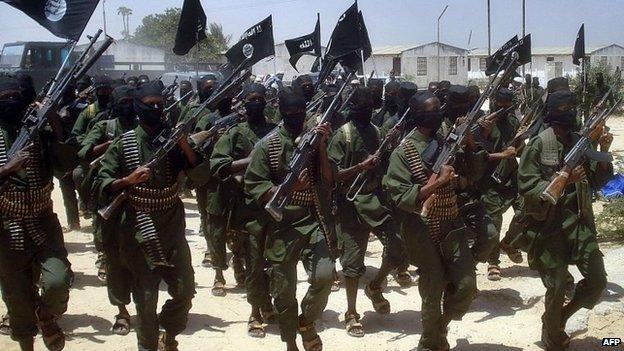
The al-Shabab militant group has continued to launch attacks in Somalia
"These crises are increasingly complex, engulfing whole regions as religion, ethnicity and power politics come together."
Last year, the UN's World Food Programme (WFP), which is funded by voluntary contributions, ran out of money to provide food vouchers for Syrian refugees. So it resorted to the kind of crowdsourcing on the internet used by cash-strapped filmmakers and ambitious entrepreneurs.
With its hashtag #AdollarAlifeline the WFP raised $64m (£42m) in a matter of days from concerned individuals and wealthy nations like Saudi Arabia.
But humanitarian crises aren't solved by one-off donations.
The WFP in Syria, which feeds four million people inside the country, where half of the population is in need, has only enough funds to provide food until the end of next month.
"The world is tired," admits Matthew Hollingworth, the WFP's director in Syria. "It's always been a bit like this, but now we are seeing diminishing interest, diminishing funds and rising needs in Syria, and elsewhere."
Syrian refugees react to the "tiring and stressful" visa requirement
The aid industry is also under pressure to find more efficient and effective ways to respond to humanitarian crises. At the December launch of the UN appeal, there was discussion of credit card transfers, greater involvement of the private sector, and greater co-ordination by UN agencies.
Talk to anyone who knows the aid business and they'll speak of reform. But they also know the real solution does not lie with humanitarian agencies, but with those who wield power and/or guns.
"The humanitarian sector - and it is more of a sector than a single system - can staunch the dying," explains David Miliband. "But it takes politics to stop the killing."
Antonio Guterres of UNHCR was characteristically blunt in a recent speech: "To those who trigger and prolong conflicts, leaving humanitarians to clean up the mess, it is time to say that this must stop. We as humanitarians can no longer pick up the pieces."
Defiant can-do
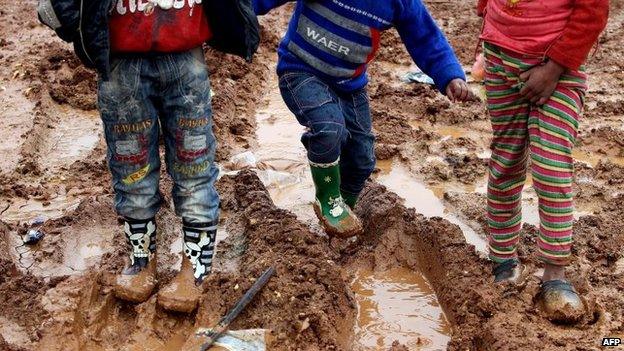
Syrian children play at a refugee camp in Lebanon
But there was a note of defiant can-do from Jan Egeland, whose career has spanned a lifetime in politics, human rights or aid.
"Of course we can sort this," he insisted, referring to Syria's humanitarian disaster. "There are more than 190 countries on earth. Why can't we come up with a burden-sharing scheme?"
"We are treating Syria as if it was a natural disaster," he said. "This is man-made from A to Z."
But there's no end in sight to this war and now, in this first week of a new year, there's another cruel blow.
A major winter storm is blowing into the Middle East, through flimsy refugee tents, cold metal trailers, and half-finished houses that barely provide shelter.
"It feels like we are in an ever-shrinking prison," a Syrian student in Lebanon lamented in an email to the BBC.
No wonder they're desperate to escape.
